Happy Earth Day, Earthlings! What are you doing to make your home a better place? If that answer is “nothing,” get out your craft supplies because today we’re taking on plastic bags.
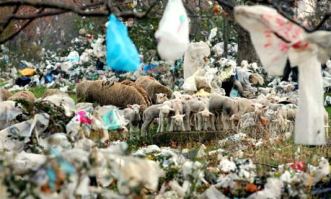 Whether you’re going to the mall, the grocery store, or just to lunch, it’s easy to give in to the ubiquity of plastic. Plastic bags are cheap or free, they’re durable and they’re convenient. But you know what they say about a free lunch: somebody’s paying for it somewhere. From production to disposal, plastic bags are doing more harm than good. The oil used to make them (more than 1.6 billion gallons each year) is only the beginning of the problem. Although they’ve been around for 30 years, no one can figure out quite how to get rid of all those plastic bags. Burning them releases toxins; burying them in landfills creates barriers for water, worms and bacteria that break down trash; and dumping them in oceans and other forgotten corners of the earth destroys habitats and turns otherwise adorable creatures into pathetic animals who exist solely to be photographed and shown on websites about pollution. Recycling is a good option, but right now only 1% of all plastic bags make their way to recycling plant. Oy vey.
Whether you’re going to the mall, the grocery store, or just to lunch, it’s easy to give in to the ubiquity of plastic. Plastic bags are cheap or free, they’re durable and they’re convenient. But you know what they say about a free lunch: somebody’s paying for it somewhere. From production to disposal, plastic bags are doing more harm than good. The oil used to make them (more than 1.6 billion gallons each year) is only the beginning of the problem. Although they’ve been around for 30 years, no one can figure out quite how to get rid of all those plastic bags. Burning them releases toxins; burying them in landfills creates barriers for water, worms and bacteria that break down trash; and dumping them in oceans and other forgotten corners of the earth destroys habitats and turns otherwise adorable creatures into pathetic animals who exist solely to be photographed and shown on websites about pollution. Recycling is a good option, but right now only 1% of all plastic bags make their way to recycling plant. Oy vey.
In the spirit of refusing, reducing, reusing and recycling (I’m still trying to come around to “rot,” you guys), we’re going to explore some of the alternatives to plastic. Switching from plastic to something a little more earth-friendly doesn’t seem like much, but it’s an easy way to cut out waste that comes from choosing habits over a little bit of contemplation.
+
T-shirt bags
Don’t know how to sew? No problem! All you need to make this bag is a t-shirt, a pair of scissors, and a safety pin. Plus it’s fringey and hippy and useful for all kinds of things.
+
Baggu Bags
Since we’re starting with the simple stuff, let’s talk about what works for those of you who are craft-challenged. Namely baggu bags. These babies are made from ripstop nylon, carry up to 25 pounds, are machine washable and fold into tiny 5″ square pouches. I can see myself carrying one of these in my day-to-day bag in case of a shopping emergency.
+
Handkerchiefs
After totally losing it upon realizing just how much money I was spending on ziploc bags, I decided there’s got to be a better way to pack my lunch. With a little inspiration from the Zero Waste Home, I started wrapping my sandwiches and pretzels in bandanas instead of baggies.
One of the biggest advantages of using cloth instead of plastic for sandwiches is breathability. Throwing a just-toasted sandwich in a baggie pretty much guarantees that you’ll be dealing with either melted plastic or a soggy sandwich come lunchtime. Wrapping it in fabric keeps your sandwich fresh and holds all the inside stuff in place so it don’t go sliding out of the bread before you’re ready to eat.
+
Origami bags
I haven’t yet figured out how to make a good bulk bag, but someone on Etsy has! Like handkerchiefs, these bags have a touch of the furoshiki about them.
+
Hat Bags
Old knit hats that are too cute to throw away but too small to wear can be repurposed as–you guessed it–bags. I mostly use my hat bags to organize smaller things inside my everyday bag (see Riese’s kit for surviving in New York).
+
Produce bags
Ladies, start your bobbins. T-shirt produce bags take all of 5 minutes to stitch up and are a lovely substitute for those plastic tissue bags they have in the fruit and veg aisle at the grocery. Delia points out that they’re also great for sandals on the beach, but I don’t see what’s stopping you from using them to hold everything you own that’s not secret or small enough to squeeze through the holes.
+
Grocery store bags
One of the great things about the commodification of environmentalism is how easy it is to find cute grocery bags. Everyone from Whole Foods to Kroger carries some version of the heavy-duty paper-or-plastic-alternative and most of them only cost $1. I use these guys for serious trips to the grocery store and for lugging dirty clothes to the laundromat.
+
Structured bags
When you’re toting something breakable–like glass–or otherwise damageable–like a banana–around with you, it’s a good idea to give it a little structure. These bags from a squared w use a cardboard shipping box as a skeleton so that your sensitive things have a special place to call their home.




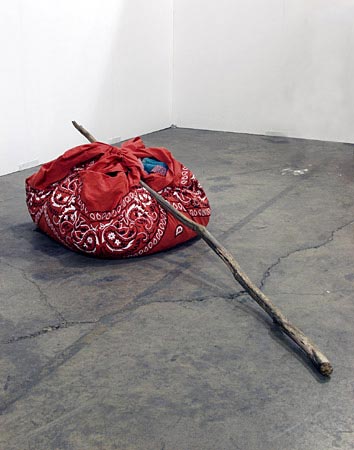
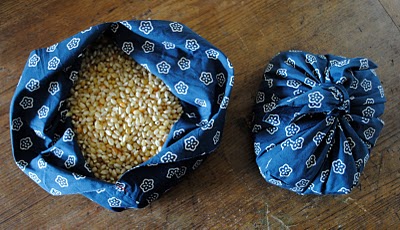

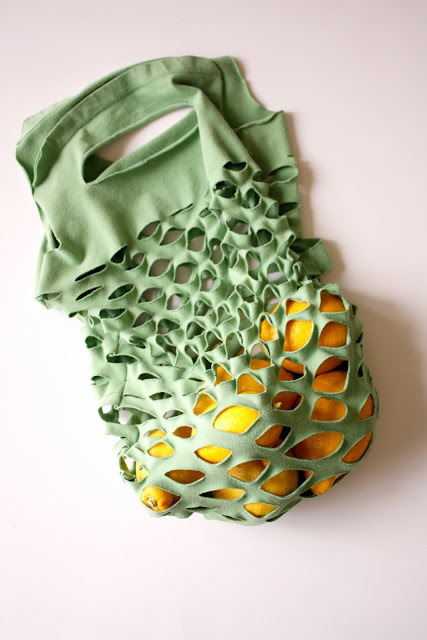
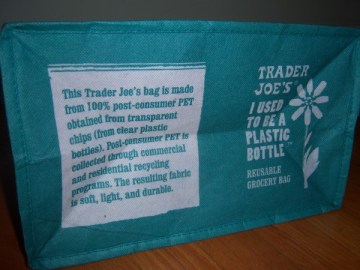
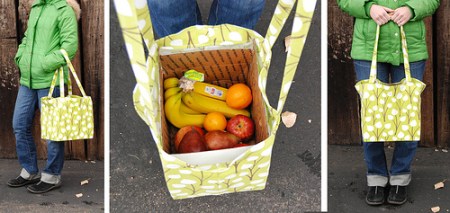

Laura, these are all awesome! I hope I have a chance to make at least one of them. A friend of mine started her own “war on plastic” a while ago, and she suggests metal containers for lunch, and bringing your own cloth/containers when you buy meat at the counter at any store.
Thanks for this! My roommate is really in to not using plastic bags and taking reusable bags when you go shopping, etc.; and while I’m with her in theory, in practice I’m so bad at it. I always forget! But this is inspiring.
I love the reusable bags from grocery stores. They hold a ton and never tear. Also, Target give you like 5 cents off for every bag you bring with you to use.
I have a friend who uses plastic grocery bags to make really cool art projects, like weaving them on a loom and stuff. They look really cool, and they kind of make you think about how many plastic bags we all go through. Seeing those was the first time it really hit me just how wasteful they are. Although, no one in my family ever went through a ton of them because everyone in our town worked at the paper mill producing paper bags. I used to get in trouble for bringing home a plastic bag.
tldr: Yay reducing/recycling!
This is the best. I also love that carrying these bags is more mainstream. I bought my girlfriend a cute for-food tote bag since her definition of carrying a bag is me, carrying her stuff in my purse.
T-shirt bags are awesome! I’ve made a few in the past. They’re great for those t-shirts you love and don’t want to throw away, but never wear anymore.
If you’re going to use reusable bags (and you should!), please do not wait until the cashier/bagger has bagged all your shit in plastic bags to tell them that you have one, because we will then passive aggressively place the plastic bag full of stuff into the reusable bag. Which kind of defeats the purpose.
Oh and everybody probably knows this already, but if you want that God Hates Bags tote, it’s here: http://revelandriot.com/shop/bags/reva-007-revel-and-riot-god-hates-bags-natural
And I never considered carrying things in a bandana, so thanks for that idea!
If you’re wrapping sandwiches that could get gooshy, like PB&J, I like Wrap-n-Mats or similar, which work like a bandana but are lined with food-safe plastic so your sandwich doesn’t leak.
I found these awesome reusable produce bags to use at the grocery store, instead of those strange greenish ultra-thin-plastic ones. http://3bbags.com/ I even put bulk (like oatmeal) in them, which is fine if you’re okay with some oatmeal dust getting around.
Also, we reuse the recloseable plastic bags that grated cheese, etc. come in. Just turn them inside out, wash them, and hang to dry. They’re often tougher than standard Ziplocs.
Along with stainless steel, I am a HUGE fan of glass containers with lock-on lids. Then you can heat up your leftovers and not have to wash another dish. I have also recently been really into pint-sized wide-mouth freezer-safe Ball jars for lunches, soups, etc.
And furoshiki is awesome for presents. I sew present bags, but my wife was missing getting to wrap presents in paper (it’s so wonderfully precise), so I introduced her to furoshiki.
I cannot get over the picture of the t-shirt bag because that person HAS NO FEET.
I really, really want the structured bag. In a cute geometric print. But alas, I cannot sew. I now need to find someone who can sew and is willing to work for whiskey.
did someone say whiskey and sewing? I think that’s my cue
why not re-use the bag you got in a store? i do that all the time. but i’m dutch and the bags we get here are plastic and strong. I don’t know about the bags you guys get in stores.
Our store bags tend to suck. Except the ones at my local market. If I have to end up with a bag, it’s from there, because their bags are reusable. The standard grocery-store bags are barely good enough to walk home with, especially if you bought anything with corners.
Tim Minchin is always relevant. http://www.youtube.com/watch?v=EVh15aUt8-c
I was checking to see if someone had already posted it because it’s totally relevant. And you did! The song gets stuck in my head like the thought of naked women, too.
Now I have to start packing my lunches in bandanas. BRILLIANT IDEA!
ALSO YOU CAN FLAG YOUR SEXUAL PREFERENCES AT THE SAME TIME
I’m just saying. Hanky code lunches.
(watch out what color you wrap your sammiches in)
I just stole about 10 sewing kits out of the hotel I stayed in a couple of nights ago. back then my friend asked me for what in the world I’d ever use these. ha!I am now the proud owner of a rad ‘produce bag’!
(also I cannot sew to safe my life thats why I just own stolen kits and no actual sewing stuff but it was effing easy!if I can do it, so can you:)
We’ve really cut down on how many plastic bags we get from the grocery store, but we can’t cut down any more how much we use them at home. Any ideas? I need to replace plastic for bin liners and for picking up after our dog when we walk him.
http://www.etsy.com/blog/en/2010/how-tuesday-how-to-make-plarn-crochet-an-eco-friendly-tote-b/
for the super crafty, make plarn and crochet a handy sack. I have always wanted to have enough patience to do this but i’ve yet to master crocheting in the first place with regular yarn. would love to have a bag like this though.
Can I point out how warm and fuzzy the title of this piece makes me feel EVERY TIME I COME BACK TO THIS PAGE?
Also I’m going to go make a bag now. Right now. From a t shirt. And watch Portlandia.
YES I’M SO GLAD YOU GOT IT!
I once spent an entire day of student teaching observations memorizing that poem. Laura, you are the wind beneath my wings.
Not getting the Portlandia reference (never seen it), but I was assuming an e.e. cummings reference.
I made the first style of bag! It works even if you’re spatially challenged like me and decide to thread the sleeve strips through all of the sections, then tie them across. Yay!
The Japanese furoshiki are my favorite. They’re more useful than you might initially think and the Japanese government even provides a handy guide on how to wrap different types of objects with them!
http://www.env.go.jp/en/focus/attach/060403-5.pdf
I use these for my lunch all the time ^_^
The classic offset is the best shopping bags site.this blog is helpful for readers and i agree with all views and information..nice blog.